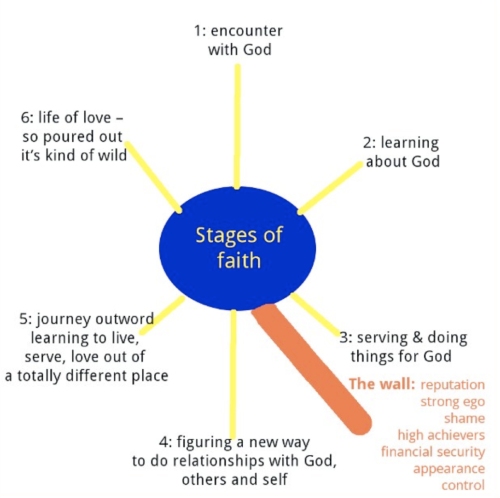Coming days I’d like to publish some writing of Martin Scott, that came to me last year. It was a blessing to me in understanding my thoughts and my emotions that came with that. May it be a blessing to you to.
Introduction
Growth in God is something that we all aspire to, but we do not always know what growth is going to look like. Professor James W. Fowler, a developmental psychologist at Candler School of Theology, in the book Stages of Faith, outlined a framework regarding a staged development of faith. It closely followed ideas associated with aspects of psychological development in children and adults.
His work has brought clarity to those who have tried to understand the huge numbers who have found themselves moving to, or beyond, the edge of what has been defined as church.
In writing the following blogs I have drawn from the following blog sources:
Theocentric.
Restoring the Heart.
Kathy Escobar.
They have, in turn, used the book by Janet Hagberg and Robert Guelich The Critical Journey, which outlines 6 developmental stages of faith. [In the notes that follow any numbers in brackets will be in reference to page numbers in this book.]
[There is also an excellent pdf chart that sets this out very neatly and is worth downloading. Here is the link.]
Introduction:
In the same way that we have stages in human life – from infancy through to old age – and each stage is common to one and all, yet our personal experience of each stage is unique, so it is spiritually. The huge challenge spiritually is to continue to develop. The threat is of becoming ‘caged’ or locked at a certain phase, either because there was no map for affirming progress, or through fear (generated internal or put upon us by external pressure) that halts the progress.
These works cited help give a map that in turns plots the journey, informs us of what to expect, but most importantly affirm the journey we find ourselves on.
A few important notes about these stages:
Stage model theory is descriptive rather than prescriptive. It helps describe what takes place – it is not prescribing how to move on.
- The stages are not to be seen as one inherently better than another.
- The stages cannot be skipped over. There are no shortcuts. We cannot go from 1 to 4, for example. It is a process though certain stages can be revisited in new seasons (albeit at a different level).
- We can get stuck at any of these stages on our journey.
- For those who feel they have ‘moved on’ it is important to remember that the earlier stages were vital. They cannot be denied to other people.
- We can intellectually grasp the stage immediately ahead, but not truly comprehend a stage that is two stages further along than our own.

